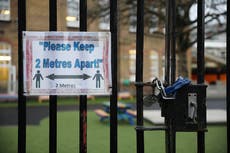All secondary school pupils to wear face masks in classrooms, government advises
Twice-weekly home testing for pupils will also be introduced
Your support helps us to tell the story
From reproductive rights to climate change to Big Tech, The Independent is on the ground when the story is developing. Whether it's investigating the financials of Elon Musk's pro-Trump PAC or producing our latest documentary, 'The A Word', which shines a light on the American women fighting for reproductive rights, we know how important it is to parse out the facts from the messaging.
At such a critical moment in US history, we need reporters on the ground. Your donation allows us to keep sending journalists to speak to both sides of the story.
The Independent is trusted by Americans across the entire political spectrum. And unlike many other quality news outlets, we choose not to lock Americans out of our reporting and analysis with paywalls. We believe quality journalism should be available to everyone, paid for by those who can afford it.
Your support makes all the difference.Secondary school pupils in England will be advised to wear masks in classrooms for the initial weeks after reopening, the government has announced as part of measures to ease the lockdown.
Officials hope the instruction, which does not apply to primary schools, will apply for a time-limited period and will be combined with voluntary twice-weekly rapid home testing for all secondary and college pupils.
The plans are part of the government’s roadmap to easing the national coronavirus restrictions in England, beginning with the reopening of both primary and secondary schools to all pupils from 8 March for face-to-face teaching.
The roadmap states: “The government recommends that the use of face coverings in higher education, further education and secondary schools is extended for a limited period to all indoor environments – including classrooms – unless 2m social distancing can be maintained.”
The National Deaf Children’s Society, however, said the recommendation for face coverings to be worn in secondary schools could have a “devastating” impact on 35,000 deaf pupils’ ability to take part in lessons.
“The government cannot make an announcement and expect this to be enough,” said the charity’s head of policy Ian Noon. “It must move quickly to show exactly how it will guarantee deaf children can still access their lessons.”
The roadmap document added that pupils in secondary schools and colleges will be asked to use a lateral flow device when they return in a fortnight – and if they test negative, they will be allowed to resume face-to-face classes.
They will be required to have four rapid tests over the first two weeks of term onsite before being asked to carry out the tests at home twice a week.
Outlining his plan, Boris Johnson told the House of Commons: “All the evidence shows that classrooms are the best places for our young people to be and that’s why I’ve always said that schools would be the last to close and the first to reopen.
“And based on our assessment of the current data against the four tests, I can tell the house that two weeks from today, pupils and students in all schools and further education settings can safely return to face-to-face teaching, supported by twice-weekly testing of secondary school and college pupils.
“Families and childcare bubbles will also be encouraged to get tested regularly. Breakfast and after-school clubs can also reopen and other children’s activities including sport can restart where necessary to help parents to work.”
However, unions have expressed concerns over a “big bang” return of children to classrooms across the country, calling for a phased return similar to Wales and Scotland where schools began reopening to the youngest pupils on Monday.
Ahead of the prime minister’s statement to MPs, the general secretary of the Association of School and College Leaders, said: “We share the government’s aim of bringing all children back to the classroom as soon as possible, but we remain concerned about the idea of a ‘big bang’ approach of a full return of pupils all at the same time.
“This is very different from the plans in Scotland, Wales, and Northern Ireland in which a phased return is planned, and it is difficult to understand why the approach in England would go so much further.
Geoff Barton added: “It is crucial that the return of all pupils to face-to-face education is safe and sustainable and that we don’t end up prolonging a cycle of disruption.”





Join our commenting forum
Join thought-provoking conversations, follow other Independent readers and see their replies
Comments